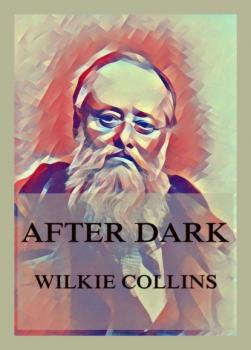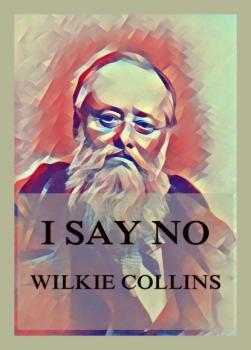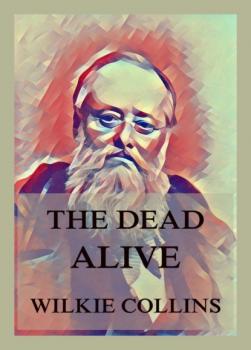Wilkie Collins
Список книг автора Wilkie CollinsThe Black Robe
'The Black Robe' combines some aim at psychological analysis with great inventiveness. Mr. Wilkie Collins never writes carelessly; and in this instance he has been especially careful. The great point of the piece is the peculiar mental haunting by a voice of one Romagne, who has killed a man in a duel; and a secondary interest, which is admirably worked out, is the contest between the Church of Rome, as embodied in the person of Father Benwell and Mr. Penrose, and love, as embodied in the person of a Miss Eyrecourt. It is necessary to say that Romagne, in the course of time, has become a man of considerable property, else he could not have the close attention of either party. The Jesuitical scheming of the Romanists and the astute forecast of Miss Eyrecourt are equally well done; and it goes without saying that there are some admirable underplots, with groups of characters, who are all sketched with that kind of decisive completeness which almost makes us doubt of their reality. Mr. Wilkie Collins's stories, however, do not depend on such tests as these: they are unreal in relation to any other world save that which lies in the mind of the artist; and it is sufficient testimony to his power when we say that if you once begin to read, you must read on; for not only does one incident develop itself out of another, but there is a glamour cast over your saner mind which sometimes makes you question how you could have been so deeply interested as you really are. For around a most conventional ideal world Mr. Wilkie Collins groups so many associations and forms of everyday life—reinforces his improbabilities by the most actual-looking letters and so on—that we are completely taken possession of, and the highest tribute of praise to him is to say that he lays hold of universal springs of interest, though he really ought hardly to do so.
After Dark
The setting for the six stories in this book is an episode in the life of a travelling portrait-painter, which we are made to learn through the charmingly simple narrative of his wife's diary. Disabled for a time by weakness of the eyes from working at his profession, his wife suggests that he should fill up the consequent deficit in their purse by dictating to her «after dark,» when her household work is done, some of the good stories he has gathered in the course of his wanderings. The well-known necessity for getting a «sitter» to talk of something that will interest him and make him forget that he has to look dignified, renders the portrait-painter ingenious in extracting personal anecdotes and bits of striking experience, so that he has two sources of unusual knowledge about men and their fortunes—observation of his sitters themselves, and a peculiar opportunity of learning what they have to tell about others. In the prologue to each of his stories our painter, in 'After Dark,' gives us something of what he has gathered from the former source; he describes one of his sitters or the persons with whom a certain commission brought him into contact, and tells us the conversation that led to his eliciting the succeeding story. These prologues are carefully and agreeably written, and have the negative charm, in these days of spasmodic writing fast rising into the importance of a positive merit—of being free from all affectation. Of the tales themselves, the main element is the excitement either of curiosity or of terror; their great merit consists either in the effective presentation of a mystery or the effective working up of striking situations. Yet the writer does not care to interest us in his personages, but only in what happens to them. Mr. Wilkie Collins seems to be without a rival in the skillful movement of a ghost or murder story, and he knows how to give the thrill of terror, without mingling that sort of offence to refined sensibilities which causes terror to pass into horror and disgust. Three admirable stories of this class are «The terribly strange Bed,» «Gabriel's Wedding,» and «The Yellow Mask.» The author of 'After Dark' seeks his moving incidents in modern life, and he usually, in the end, interprets the supernatural into the natural.
I Say No
The popularity of Wilkie Collins is as unquestionable as his mannerism, and when this story bears the title 'I Say No', it is characteristic of him that the meaning of this title is not made clear until three fourths of the novel has been read. The plot is, as usual, very carefully and strongly conceived, and the reader is allowed to think that he has the clue to the secret at an early period, whereas the secret is really quite different from what seems most probable. The general effect of 'I Say No' is much less sensational than many of the author's former stories. The situations are not void of theatrical tone, but they are distinctly quieter and more subdued. It is in fact more the society play than the melodrama, but it is dramatic. The women of, Mr. Collins's novels are usually weaker than his men, and his old and eccentric women are better than his young girls. Perhaps this is because all his women are really men worked over, so to speak, and his old women are the most natural because age has a tendency to assimilate the characteristics of the sexes. Miss La Sor, in the new story, is decidedly disagreeable, but her vices are rather those of human nature than of a woman, and she is drawn with a certain vague indeterminateness, as though the author originally meant her to fill a much more important place, but had thought better of his purpose. The story indeed is considerably shorter than most of Mr. Collins's novels, and the plot is far less intricate. This the reader will be apt to resent, for it is plot, and plenty of it, he wants when he goes to this author. Wilkie Collins has always had a large audience, however, and unless his powers fail, as this latest of his works certainly does not appear to indicate, he always will be read widely. And this is right, for he is a thoroughly wholesome and sweet writer, whoever punishes Vice and rewards Virtue, and gives us the most fascinating and complicated of plots, and thrills us with cunning detective enterprises, and surprises us with novel modes of committing crimes, and getting married, and perpetrating, bigamy, and all kinds of exciting affairs. And the world will prob ably always prefer novelists of this school to those who delight in analyzing thoughts and sentiments, and who eschew action and plot as vulgar and coarse.
The Dead Alive
A curious story of two brothers who are tried for a murder and found guilty under strongly convicting circumstances. After pleading innocence of the crime, they strangely make a confession to the effect that they murdered the man, who at the last moment turns up alive. The author, in a note, says whatever seems improbable in the story is a fact, and whatever reads like truth is pure invention. Truth or fiction, however, the little book will while away an hour very pleasantly.
The Moonstone
"I'm sick to death of novels with an earnest purpose. I'm sick to death of outbursts of eloquence, and large-minded philanthropy, and graphic descriptions, and unsparing anatomy of the human heart, and all that sort of thing. Good gracious me ! Isn't it the original intention or purpose, or whatever you call it, of a work of fiction, to set out distinctly by telling a story? And how many of these books, I should like to know, do that? Why, so far as telling a story is concerned, the greater part of them might as well be sermons as novels. Oh, dear me! what I want is something that seizes hold of my interest, and makes me forget when it is time to dress for dinner—something that keeps me reading, reading, reading, in a breathless state, to find out the end." Wilkie Collins' confession of faith as a novelist is comprised in the above speech of his sprightly heroine, Miss Jessie Yelverton, in 'The Queen of Hearts'. He is emphatically a story-writer. He is unrivaled in the construction of an elaborate and intricate plot, and he certainly succeeds in making his readers «go on reading, reading, reading, in a breathless state, to find out the end.» Wilkie Collins' career has been a progressive one. There are some ardent novel readers who will doubtless remember the publication of 'Antonina', and a few years later of 'Basil' – two books of singular power. Soon after Mr. Dickens commenced the publication of Household Words, there appeared in that periodical a number of short stories which were remarkable for the perfection of their style, the elaboration and originality of their plots and their general artistic finish. Then came a novel, 'The Dead Secret', also published in Household Words, in which the wonderful skill of the author in con structing and unfolding a plot was for the first time fully displayed. The 'Woman in White followed', and the claims of Wilkie Collins to be considered a great novelist were at once firmly established. He is, however, no mere weaver of intricate plots—no teller of elaborately constructed stories only. Few characters in modern fiction are as well drawn and sustained as that of Count Fosco, the cool, sensible, intellectual villain in 'The Woman in White.' Collins also possesses, in common with Anthony Trollope, the power of delineating a heroine who shall be neither a dressed-up doll nor an impossible angel. Rachel Verinder in 'The Moonstone' bears witness to the truth of this assertion. This novel is the best that Mr. Collins has given to the world and possibly the best he has ever written. The story is singularly original; and when we remember the force and extent of Hindoo superstition, we can scarcely venture to pronounce it improbable. And how admirably is the story told! Clear, lucid and forcible in style, never straying into the alluring but pernicious paths of description or dissertation, the narrative moves onward in its unbroken and entrancing course. Let the impatient reader, hurrying to reach the dénouement, skip half a dozen pages. Instantly the thread of the story is broken, the tale becomes incomprehensible, the incidents lose their coherence. 'The Moonstone' is a perfect work of art, and to remove any portion of the cunningly constructed fabric destroys the completeness and beauty of the whole.
Miss or Mrs.?
'Miss or Mrs.?' is a story in outline, and maybe the only instance in which Mr. Wilkie Collins has wasted his material; an entire novel might be constructed in his architectural style from its Incidents. There are several specimens of Mr. Wilkie Collins's neat, precise humor in this story, and the rudiments of at least one capital character. We hope to meet Lady Winwood on a wider field of action, and should be very glad to hear details of her household policy, and the final pulverization of her ladyship's step- daughters.
The Two Destinies
The story of two people who begin to love each other as boy and girl. Some mysterious agency seems to be at work, all through the story, in their behalf; for though apparently separated as children forever, they are brought together again by a most singular chain of circumstances. Apparitions and other strange hallucinations abound in the work. Altogether a pleasantly weird and odd story, and very much different from Wilkie Collins' other novels.
The Guilty River
Gerard Roylake, returning from the continent to England to receive his in heritance, finds that one of his tenants a miller in the old mill on the banks of that dark, gloomy, repellant river, the Loke, has a lodger and a fair daughter. The lodger is a strange man, remarkably handsome, deaf, and an odd combination of knave and tool, the former characteristic predominating. It is from these picturesque elements, that Mr. Collins evolves his tragedy. The details of mystery are worked up in the author s skillful way. The denouement is a surprise. The question of heredity is finely handled.
Poor Mrs. Finch
Mr. Wilkie Collins brings to his work, along with other and valuable qualities, the special talent of the private detective and the criminal lawyer. Almost no modern novelist stands in any comparison with him for skill in constructing the engrenage, as a Frenchman would call it, of personal complication, for subtle delicacy in fitting together wheel and spring, pivot and pinion of his dramatic clockwork, in such fascinating interplay as shall lead the attention of the breathless spectator smoothly, imperceptibly, but inevitably to the final wind-up of the catastrophe. This skill in combining events is supplemented by, or rather cognate with, his shrewd analysis of character and motive. It is his favorite plan to suppose a case of private relation where virtuous personages or important interests are threatened by the schemes of some clever villain. Against him Mr. Collins, in the person of his beneficent and equally clever hero or heroine, straight sets his wits to defend the interests or persons attacked. The resulting struggle is carried on with the most exquisite skill of fence, involving both practical device and metaphysical penetration and shrewdness, till the final triumph of the right and confusion of the wrong-doers. In this book the metaphysical element assumes unusual importance. The book is in so far an exception to the usual run of Mr. Collins's works, that it is less a leaf from the records of Scotland Yard than an extract from the diary of a psychologist. There is a villain and a protecting genius, as usual ; but the villain is only a half one after all, and we are less interested in the actual facts of his rascality than in the causes which lead him to it, and the temperament which renders it possible. In the leading character, poor Miss Finch herself, the author develops an interesting question of medical psychology. A young girl, blind almost from her birth, loves one of two twin brothers, who has, in the process of medical treatment for epilepsy, been terribly disfigured in complexion by the use of nitrate of silver. From Lucilla's instinctive horror of dark objects, the injudicious and timid concealment by the lover of his dusky hue, and the treacherous advantage taken of these things by the other twin, Nugent, to supplant his brother – the whole complicated by Lucilla's temporary restoration to sight and subsequent relapse – arises the whole intrigue of the story …









